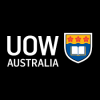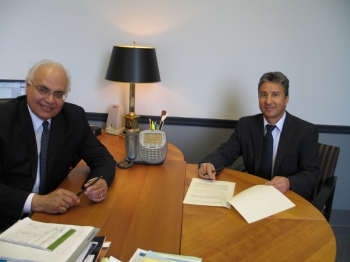Dr. Moeness Amin Earns Visiting International Scholars Award
By Daniel Fetsko ’19 CE

The University of Wollongong, Australia (UOW), has presented a Vice Chancellor Visiting International Scholar Award (VISA) to Moeness Amin, PhD, director of Villanova University’s Center for Advanced Communications. The purpose of the $10,000 grant is to support internationally based, outstanding and well established researchers to visit UOW for a period of two-to-six months to share their expertise, interact with UOW students and faculty on various research projects, and conduct seminars on emerging areas of research and technology. Dr. Amin is one of only 10 recipients selected for this highly competitive program in 2016.

CAC Director Dr. Moeness Amin with Dr. Salim Bouzerdoum, Associate Dean for Research, Wollongong University.
For the extensive VISA application, Dr. Amin was required to submit his research plan, explaining research aims, significance, and outcomes. The plan also addressed the strategic benefits to UOW and enumerated the outreach activities during and after Dr. Amin’s visit to campus. The VISA applicant was also required to submit a list of his past five year publications and to indicate those most relevant to the proposed project. Dr. Amin’s goal is to increase the effectiveness of hand-held radar sensing equipment in urban settings. This research will build upon the work he has done on vehicle-mounted sensors, which are far more expensive and less adaptive. Dr. Amin explains, “An improvement in the quality of the mobile and efficient hand-held system would allow much better quality imaging and target tracking capabilities of radar devices.”
This is not Dr. Amin’s first connection in Australia. He serves as a Partner Investigator on two grants from the Australian Research Council, exceeding A$1 M, co-authored 40 papers with colleagues from three Australian academic and defense institutions, and served as a co-advisor of two PhD students from the University of Wollongong and the University of New South Wales. In addition, the Center for Advanced Communications has hosted two Australian faculty members during their sabbaticals in 2012 and 2015.
